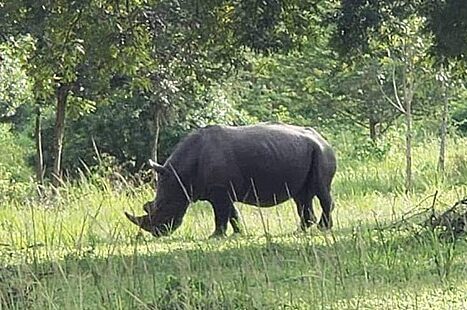
Rhino poaching has reached an all-time high in Namibia.
According to officials, the number of endangered rhinos taken from Namibia in the previous year was almost twice as many as it had been the year before.
According to official government data, 87 rhinos were killed, compared to 45 in 2021.
According to officials, the majority were taken from Etosha, Namibia’s largest national park.
In recent decades, the number of rhinos in Africa has significantly decreased to meet China and Vietnam’s demand for rhino horn.
Romeo Muyunda, a spokesperson for the Ministry of Environment, Forestry, and Tourism, stated that poachers killed 61 black and 26 white rhinos, with 46 rhinos found dead in Etosha.
“We note with serious concern that our flagship park, Etosha National Park, is a poaching hotspot,” Mr Muyunda said.
Before hacking off the horn and killing the animals, sophisticated equipment is now used by international criminal gangs to track and calm the animals.
Wildlife teams have had to saw off rhino horns in order to keep the animals alive due to poaching in Botswana and South Africa.
Despite its lack of documented medical benefits, rhino horn has been used in traditional Chinese medicine for many generations.
Demand for horns, which are regarded as a symbol of wealth in Vietnam, is another factor that contributes to poaching.
With just over 5,000 remaining, the black rhino is the most endangered.
However, the number of elephants killed in Namibia has decreased from 101 in 2015 to four this year.
——————————————————————————
At Natural World Fund, we are passionate about stopping the decline in our wildlife.
The declines in our wildlife is shocking and frightening. Without much more support, many of the animals we know and love will continue in their declines towards extinction.
When you help to restore a patch of degraded land through rewilding to forests, meadows, or wetlands, you have a massive impact on the biodiversity at a local level. You give animals a home and food that they otherwise would not have had, and it has a positive snowball effect for the food chain.
We are convinced that this is much better for the UK than growing lots of fast-growing coniferous trees, solely to remove carbon, that don’t actually help our animals to thrive.
This is why we stand for restoring nature in the UK through responsible rewilding. For us, it is the right thing to do. Let’s do what’s right for nature!
Support our work today at https://naturalworldfund.com/ and join in the solution!

